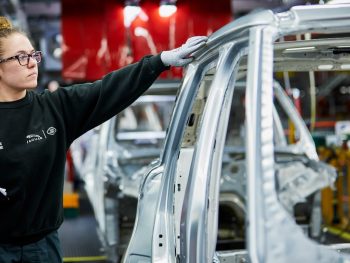UK car production slumps to lowest October level since 1956
UK car production tumbled 41% last month with 64,729 units produced – the weakest October since 1956.

UK car manufacturing output tumbled 41.4% in October with 64,729 units produced
It was the fourth straight month of decline as firms continue to grapple with the global shortage of semiconductors, forcing production stoppages.
And the fall has been exacerbated by the closure of Honda’s Swindon plant at the end of July, according to the new data from the Society of Motor Manufacturers and Traders (SMMT).
More positive news lay in the fact that production of the latest battery electric (BEV), plug-in hybrid (PHEV) and hybrid (HEV) vehicles accounted for nearly a third (30.9%) of all cars made in October.
BEV manufacturing alone rose 17.5% to 8,454 units, rising to over 50,000 units for the year to date – more than the whole of the pre-pandemic 2019.
Overall production in October for domestic and overseas markets fell by 37.9% and 42.1% respectively.
For the year to date, total output is down 2.9% to 721,505 units despite 2020 having been badly hit by factory closures arising from the first lockdowns.
The SMMT said the “worrying” figures underscored the devastating impact of the semiconductor shortages and structural changes required.
Chief executive Mike Hawes continued: “Britain’s automotive sector is resilient but with Covid resurgent across some of our largest markets and global supply chains stretched and even breaking, the immediate challenges in keeping the industry operational are immense.”
He added: “Government can help the industry with measures to boost competitiveness in line with global rivals, notably in tackling high energy costs, supporting employment and training, and helping businesses whose cashflow is under pressure from these historically poor production numbers.”
Responding to the new statistics, Richard Peberdy, UK head of automotive at KPMG, said the challenges and fall-out would last into next year.
“Carmakers are having to prioritise models and markets, and that will continue into 2022.
“Increasing inflationary pressures only add to this challenging picture, leading to revised forecasts.
“But whilst there are fewer cars leaving the factory, those that do are selling, quickly, and with less discounting than historically required.
“Demand continues to outpace supply, and by the time these supply chain issues ease there will likely be a lot of pent-up demand to be met on forecourts.
“But for now that will still feel a long way off for a number of carmakers.”












